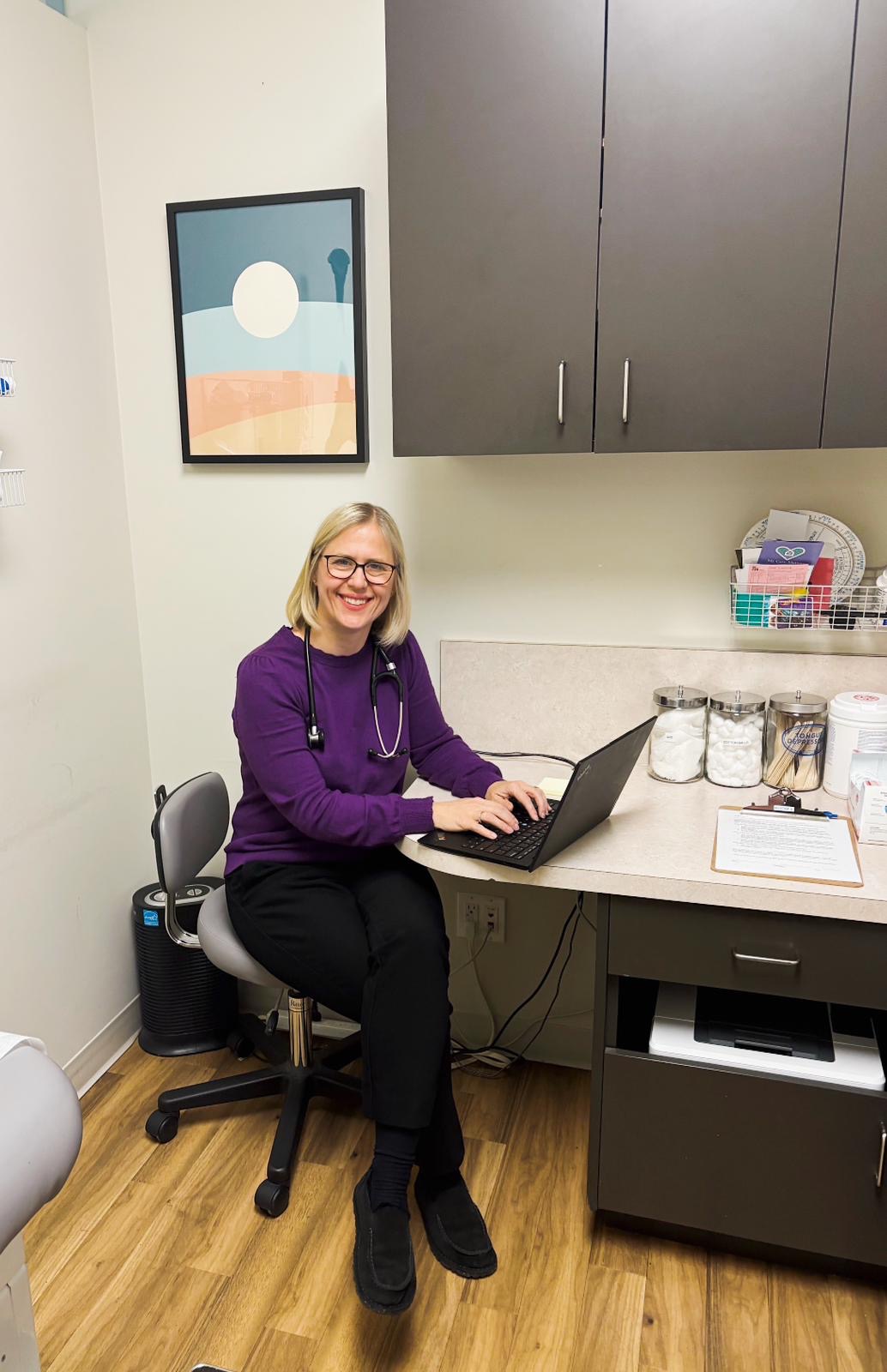Dr Krystine Sambor says she has richer conversations with her patients and is less drained doing paperwork, thanks in part to the use of AI scribe.
The North Vancouver family physician says artificial intelligence (AI) technology has helped to reduce the burden of her daily charting by converting a transcript of her clinical conversations into a SOAP note.
While she must still add details around the physical exam and thoroughly edit the transcripts while they’re fresh in her mind, she says, “it’s a lot less cognitively tiring at the end of my day.”

Pictured: Dr Krystine Sambor
“The main motivation [for AI scribe] was what we all hear about the burdens of paperwork—and I was in that space,” says Dr Sambor, who works with the North Shore Medical Group and is a board member of the North Shore Division of Family Practice. “I felt like I was always charting. It has certainly given me a bit of time back. Most of the details are captured and I’m editing rather than typing.”
Artificial intelligence is increasingly transforming the primary care landscape. AI scribe is top of mind for most physicians in BC, but other technology is becoming available such as predictive analytics, virtual health assistants, diagnostic support, and personalized treatment plans, to help reduce administrative burdens.
These technologies use various AI models, such as natural language processing, automatic speech recognition, and machine learning models to interpret spoken words, understand context, and discern medical terminology by listening to conversation.
Dr Sambor, who describes herself as an “early adopter” as she has used AI scribe for the past year, says the program gives her a start on the transcript, which she can flesh out later.
Still, it’s not as easy as just cutting and pasting. Dr Sambor cautions that using AI scribe requires due diligence to ensure her notes are thorough and accurate and her patients’ privacy is protected. In some cases, AI scribe may misinterpret information or add information that was not part of the conversation.
“The main thing I tell my colleagues is you absolutely have to edit especially if you’re asking the AI to be concise as it will take out items that are potentially important,” Dr Sambor says. “It’s really important to edit while that encounter is fresh in your mind.”
Doctors of BC is working to support members in navigating the use of AI and Digital Health. The Digital Health and Privacy team is involved in provincial and national conversations on privacy and implementation considerations around integration of AI into physician practices.
Guidance developed by the Doctors Technology Office (DTO) focuses on practical considerations for choosing and implementing an AI scribe solution in practice. Physicians can get help integrating AI into their clinic workflow, or access peer mentorship from physicians like Dr Sambor, who are experienced in using the program. For support with your practice needs, submit a service request here.
Privacy and security remain a huge focus. Physicians must ensure that any AI scribe technology they implement meets current industry security standards, and that appropriate steps are taken to safeguard patient data.
“The thing that holds some of my colleagues back is we want to be clear there are good privacy protections for the patients,” Dr Sambor says. “We all want to use the AI technologies safely and to have that guidance to make sure.”
Dr Sambor says most of her patients have surprisingly been enthusiastic in consenting to her using AI scribe—something she asks at every visit.
As she’s “not a naturally fast” typist, Dr Sambor says the application has resulted in her patient visits being more natural and richer because she doesn’t have to talk, type, and problem-solve at the same time.
“I find I capture a bit more flavour; something I might not have the mental capacity to write down,” she says, adding the audio is later erased.
The College of Physicians and Surgeons of BC (CPSBC) has also released interim guidance to help promote responsible use of AI.
Although there is not yet hard data in BC, anecdotal feedback suggests most physicians who are using the application are experiencing positive impacts both mentally and physically and saving time.
“Doctors of BC is working to better understand the potential of AI scribe to reduce members’ administrative burdens through pilots with family physicians and specialists,” says Dawn Lake, Vice President of Digital Health & Privacy Officer.
Beyond AI scribe, Doctors of BC also sought feedback in November from physicians around the broader integration of AI in health care, with an online member engagement exploring perspectives and seeking details on what guidance and resources are needed to support AI application in health care.
Dr Sambor says she would like to see a vendor-neutral consent form, as she continues to look for the best application match for her style of charting.
“Dr Sambor’s request is one of the top questions Doctors of BC gets related to AI, and we have begun dialogue with BC’s Office of the Information & Privacy Commissioner to update our guidance to support members,” Lake says.
Dr Sambor has been training the application to write in her style, which is mainly taking down point form pertinent information.
“When I first started it was very new, so it was very wordy and needed a lot of editing. It’s not perfect but it’s getting a little closer,” she says. “I don’t know if I found my forever vendor because each vendor keeps improving.”
Members with questions about the privacy, secondary use of data, and ethical considerations can email privacy@doctorsofbc.ca.
